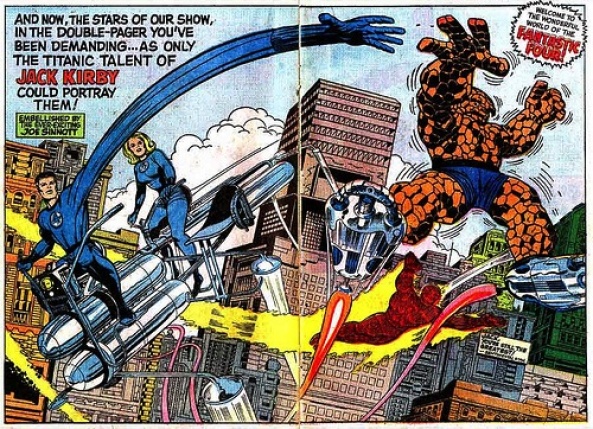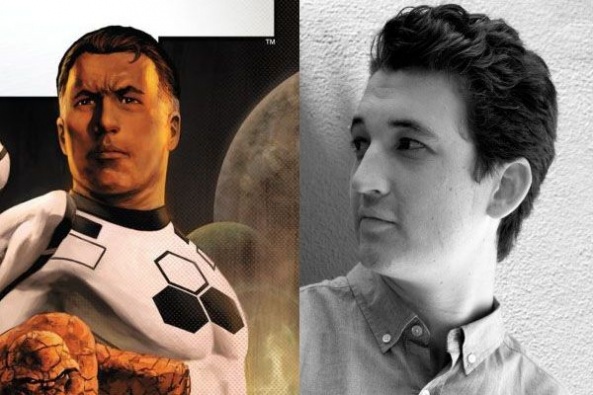
As tends to be the case in our fast-paced, social media driven lives, everyone is weighing in on the casting announcements for Josh Trank’s upcoming “Fantastic Four” film. That’s right, from Erik Larsen to Zach Braff, social media is all atwitter with opinions on it. For the most part, there’s a sense of apathy or a mocking tone set against the property, which has already been somewhat tainted by the Tim Story-directed versions from almost a decade ago.
However, start reading the comment sections or search a little deeper on Twitter and you’ll find some really harsh and actually sometimes disturbing reactions to the cast for a variety of reasons. Startling parallels to Fox News and Megyn Kelly’s “War on Santa Claus” started to occur to me. “Johnny Storm is white. He just is.” I’m used to seeing awful things on the internet; I know that you’re not supposed to read the comments, but the true scope of the comic book fan reaction didn’t really register with me until I saw a poll over at Comic Book Resources regarding the casting decisions. At the time of writing, 64% of responders have determined that these casting choices have doomed the film before shooting has begun.
At first glance, one thing is certainly true: these 4 actors put together do not look like any “Fantastic Four” team you’ve ever seen in a comic book. Down to each member, none of them look like the team that Stan Lee and Jack Kirby invented, they don’t look like the team that James Robinson is currently inheriting, and they don’t even look much like Bendis & Millar’s “Ultimate Fantastic Four” – though that’s probably their closest analogue. For a startling number of fans, that’s enough to write this whole thing off.
On that note, Multiversity editor David Harper posed an interesting rhetorical question: “Is this still the Fantastic Four? Or is this just a superhero movie with a familiar brand name?” Rhetorical as it was, what follows is my perhaps foolhardy effort to answer that question.
The Cast
Take away the superficial aspects of the characters as they’re most commonly depicted, and I don’t think it’s a stretch to say that we’re not missing anything here. Again, that’s where an unfortunate number of people draw a line in the sand. If they don’t look like the “Fantastic Four”, then they aren’t the “Fantastic Four” – I don’t think there’s any convincing them.

Let’s look at Mr. Fantastic, Miles Teller. I think we can generally agree that Reed Richards needs to be endlessly brilliant, a little dangerous when it comes to science, and confident/charming enough to get his cohorts to do dangerous things. It also behooves film studios to have a charming, witty lead regardless of what character he’s portraying. Humor is the ultimate secret weapon of Marvel Studios’ success, after all. With The Spectacular Now as my submission for evidence, Teller can emit those qualities pretty easily. He’s a man you’re intrigued by – a man you want to follow. Teller has leading man gravitas in a young man’s body. But that’s clearly the hangup here, for some. At 27, he’s hardly the salt-and-pepper-hair-havin’ entrenched family man that Reed Richards is almost universally depicted as. That fact is going to be a recurring theme here.

Next let’s look at Sue Storm, Kate Mara. In House of Cards, she proved to be a formidable foil for Kevin Spacey’s ruthless career politician, Frank Underwood, and she played vulnerable in both Happythankyoumoreplease and American Horror Story. Sue Storm needs plenty of steel to rein Reed in (or deal with the consequences when he takes the family too far), but she also needs to be the heart of the family – something that Reed often overlooks. Mara is both a more accomplished actress than Jessica Alba ever was and a better fit for a more well-rounded take on Sue Storm. I suspect that’s what we’ll get.

Benjamin Grimm’s key qualities are his dependability, his physical torment, and the tough-guy-with-a-heart-of-gold that his rough and tumble upbringing has instilled in him. We generally see him depicted as a bigger, bulkier sort of street-tough, but again that’s a superficial quality that is a visual parallel to his personality – not something inherent to his character qualities. Jamie Bell has the ability to be a chameleon in his roles, having shown quite a bit of range throughout his career. His ability to play a wiry upstart is not that far removed from Ben Grimm from a pure personality standpoint. Need proof that he can be as tough as they come? Defiance, while not a great film, is a good showcase for Bell’s ability to get gritty.
Continued below
That brings us to the most obvious hot-button topic: Michael B. Jordan as Johnny Storm. It’s been beaten to death, but his performance in Chronicle basically serves as a de facto audition for the role of “Johnny Storm.” Johnny has a showy personality and plays by his own rules, but ultimately comes through in the clutch when his family needs him. Friday Night Lights is also a great “selfish-guy-turned-hero” showcase for him, while his turn in Fruitvale Station is the best pure performance from anyone in this group of actors. Your movie is probably better with Michael B. Jordan in it, no matter who he’s playing — and whatever becomes of this film, Jordan’s performance will likely be a highlight.

The Comics
How do we decide what interpretations or qualities of the “Fantastic Four” characters are valid from the comics? As truly wonderful as the original Stan and Jack stories are (and they really are), I don’t think they reflect the totality of the characters, even though they were the ones who created them. Is having Sue Storm acting as damsel in distress, as Stan and Jack often utilized her, your ideal version of the character? Or should she be the formidable intergalactic power player that we see in the comics today?
In a medium that is obsessed with “secret origins”, alternate universes, new powers, etcetera; age or skin color seems to be a downright silly reason to dismiss talented people that can check off all of the other boxes. After all, comic readers can accept the fact that Flash Thompson served in Vietnam at one point, but now is considered to have served in Iraq thanks to the sliding timescale of a 50 year-old ongoing comic books. Much of what makes “Flash Thompson” who he is is due to what happened to him in Vietnam, but Vietnam was a different time and place and an entirely different political/social climate than Iraq. In many ways, “Vietnam” to “Iraq” feels like a bigger change than “white” to “black” to me; Flash is defined more by Vietnam than Johnny is by the fact that he’s white — it’s just harder to notice at first blush because one is visual and one is not.
I’m playing devil’s advocate, because I realize why Marvel and DC Comics “need” retcons, crises every 5 years, and sliding time fudging. Some have opined that it’s more difficult to explain that one of the Storm children is adopted or that it’s “confusing” — I disagree. Three or four different Peter Parker clones running around is confusing. Trying to figure out how Flash Thompson met Sha Shan now is confusing. The Fantastic Four’s extended family, including future and alternate versions of themselves is confusing. What Marvel is doing right now in all of their “Avengers” titles — going back to all of these weird, alternate, seldom-used universes and characters — that is confusing.
If you accept the wonky stuff that decades old comic books try to get by you on a weekly basis, explaining Josh Trank’s “The Fantastic Four” to a comic fan should be as easy as saying “Hey, that guy from Fruitvale Station is Johnny Storm now.” That goes quadruple for movie-goers who don’t even read comics, especially since they have no real investment in “Johnny Storm” as a character.
Continued belowThe Superhero Fans of Today (and Tomorrow)
“So why can’t they just create new black/asian/female/trans characters instead of changing our old ones?”
Unfortunately, when discussing blockbuster comics and films, we’re at the intersection of art and commerce. Guess which side the companies are leaning far more heavily towards? I admit that when it comes to cape books, I’m just as guilty. Wally Wests are rare. It’s natural to be more invested in characters that have been around longer, have a richer history, and got their foot in the door when there was more room for big goofy superhero feet to actually get in that door.
If we keep making movies and comics that stick stringently to these characteristics, then we are destined to make decades worth of “Avengers” films that have probably one female hero (two, if you’re lucky) and one black hero — and he might always be Nick Fury. Your “Fantastic Four” will always be a whitewash. “X-Men” will mostly be a whitewash with a handful of exceptions (hell, stick too closely to some of those characters and you’re bordering on some bad stereotypes). “Justice League” needs John Stewart or Cyborg or you’re basically screwed there too.
These are your big franchises. These are your moneymakers. If you stick with history, then there’s no diversity — no racial diversity, no gender diversity, no sexual diversity.
“Why is that a problem?” Because it’s not representative of the world that we live in. Because isn’t it better for everyone if a little boy or little girl or confused teen or outcast can leave the movie theater thinking “wow, there’s someone who’s more like me than I thought superheroes could be!”? You’ll excuse me if I resorted to a cheesy “but just think of the children!” moment there for a minute, but making new characters doesn’t reliably put new characters into the public eye. Infusing diversity into the comics and shows and films that we consume is a better option for progress — and for some fat cat’s wallet at the same time. The point being, science fiction and fantasy are supposed to be on the forefront of progress and inclusion. They’re supposed to push past what we have now and challenge the status quo.

To me, the “Fantastic Four” is a couple of key things: first and foremost, they are the tightest family unit in superhero comics. That extends to everyone who lives in the Baxter Building with them. After all, Benjamin Grimm isn’t blood, but anyone would identify him as family. In an ever-changing world, great stories stand the test of time by containing universally resonant elements. The reason that “Fantastic Four” is such an enduring concept is because its core “family” theme resonates with everyone, even if they have a non-traditional family. The team operates as a family unit in everything that they do and that doesn’t change if you change the age, race, or gender of any of the characters. Beyond that, they’re scientific pioneers in every sense of the word. They’ll go headlong into any sort of sci-fi danger or mystery, and they’re all in it together.
If Josh Trank captures that in his final product, then that’s the Fantastic Four. As long as there’s four main characters (“The Fantastic Four has four people in it. It just does.”), there’s a strong family dynamic, and they go fearlessly into scientific adventure, then they will have made a “Fantastic Four” movie. I think that these casting choices were quite clearly made with that spirit in mind.






